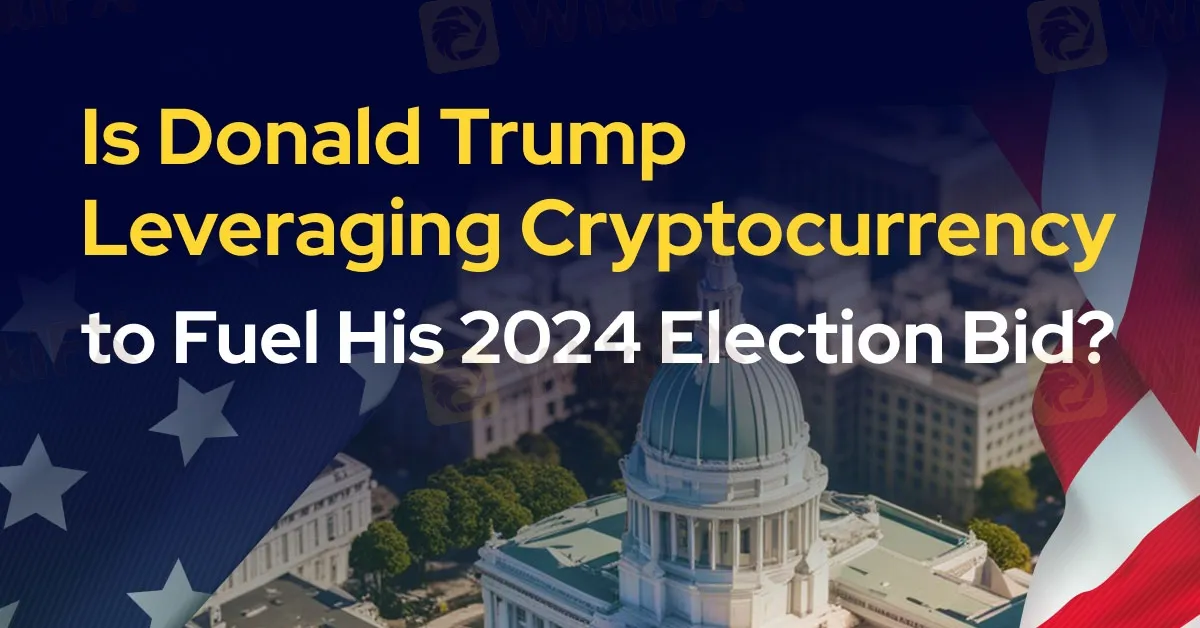简体中文
繁體中文
English
Pусский
日本語
ภาษาไทย
Tiếng Việt
Bahasa Indonesia
Español
हिन्दी
Filippiiniläinen
Français
Deutsch
Português
Türkçe
한국어
العربية
Is Donald Trump Leveraging Cryptocurrency to Fuel His 2024 Election Bid?
Abstract:This article explores the speculative yet provocative notion that former President Donald Trump might be leveraging cryptocurrency to fuel his 2024 election campaign, highlighting the potential implications and sparking debate on the evolving intersection of politics and digital finance.

As the 2024 U.S. presidential election looms, former President Donald Trump remains a figure of intense scrutiny and controversy. Among the many strategies speculated to be part of his campaign arsenal, one stands out for its novelty and potential impact: the use of cryptocurrency. This emerging technology, often associated with decentralization and financial innovation, might be playing an unexpected role in Trump's bid to reclaim the White House.
To understand the current discourse, it is essential to revisit Trump's historical stance on cryptocurrency. During his presidency, Trump was a vocal critic of Bitcoin and other cryptocurrencies, famously tweeting in 2019 that he was “not a fan” of Bitcoin and that it was “highly volatile and based on thin air.” His administration also took a cautious approach towards digital currencies, emphasizing the potential for misuse and the need for regulation.

Cryptocurrencies offer several appealing features for political campaigns. Firstly, they provide a new avenue for fundraising. Crypto donations can bypass traditional banking systems, potentially making it easier to collect contributions from a global supporter base. The transparency of blockchain technology, combined with the anonymity it can offer, makes it a double-edged sword—both a tool for open accounting and a means to obscure donor identities.
Additionally, the increasing mainstream acceptance of digital currencies could help attract younger, tech-savvy voters. Aligning with the crypto movement might position a candidate as forward-thinking and in touch with the future of finance, a narrative that could be beneficial for any political campaign.
Rumours of Trump's involvement in crypto have been fuelled by various unverified reports and speculative analyses. Some claim that Trump's campaign has been quietly accepting crypto donations, citing blockchain transactions that align with his public appearances and rallies. Others suggest that prominent Trump supporters in the tech and finance sectors might be channelling funds through cryptocurrencies to support his bid.
However, concrete evidence remains elusive. The lack of transparency inherent in the crypto world makes it difficult to definitively trace these claims. What is clear is that the conversation around Trump and cryptocurrency is gaining traction, prompting both supporters and detractors to weigh in.
If Trump is indeed leveraging cryptocurrency for his campaign, the implications could be significant. It could signal a broader acceptance of digital currencies in mainstream politics, potentially influencing regulatory approaches and public perception. Moreover, it might encourage other candidates to explore similar avenues, further integrating crypto into the political landscape.
On the flip side, such a move could also draw criticism and concern. The volatility of cryptocurrencies and their association with illicit activities could be used as arguments against their legitimacy in political finance. Additionally, the potential for anonymous donations might raise ethical and legal questions about transparency and accountability in campaign funding.
As with many aspects of Donald Trump's political career, his potential involvement with cryptocurrency is a topic ripe for debate and discussion. Whether viewed as a savvy embrace of future technology or a controversial and risky strategy, the intersection of Trump and crypto is an unfolding story that warrants close attention.
In conclusion, while the evidence remains inconclusive, the mere possibility of Trump using cryptocurrency to back his election campaign is enough to pique interest and ignite conversations. As the 2024 election approaches, the role of digital currencies in politics will likely become an increasingly pertinent issue, reflecting broader trends in technology, finance, and governance.

Disclaimer:
The views in this article only represent the author's personal views, and do not constitute investment advice on this platform. This platform does not guarantee the accuracy, completeness and timeliness of the information in the article, and will not be liable for any loss caused by the use of or reliance on the information in the article.
Read more

Hong Kong Stablecoins Bill Boosts Crypto Investments
Hong Kong's Stablecoins Bill sets regulatory standards for crypto issuers and platforms, aiming to protect investors and strengthen the city's crypto investment appeal.

What Impact Does Japan’s Positive Output Gap Have on the Yen?
The Japanese government has announced that, due to a tight labor market, the country’s economic output is expected to return to full capacity in the next fiscal year for the first time in seven years.

Malaysia Pioneers Zakat Payments with Cryptocurrencies
Malaysia has taken a significant step in modernising religious practices by becoming the first country to enable zakat payments through digital assets.

21 Arrested in Telangana Cryptocurrency Scam
Telangana Police arrests 21 in a cryptocurrency scam. Cybercriminals extorted money, laundered ₹8.2 crore, and transferred it via wallets linked to Dubai.
WikiFX Broker
Latest News
Russia to Fully Ban Crypto Mining in 10 Regions Starting January 1, 2025
Why is there so much exposure against PrimeX Capital?
Two Californians Indicted for $22 Million Crypto and NFT Fraud
WikiFX Review: Is Ultima Markets Legit?
Colorado Duo Accused of $8M Investment Fraud Scheme
What Impact Does Japan’s Positive Output Gap Have on the Yen?
Malaysia Pioneers Zakat Payments with Cryptocurrencies
FCA's Warning to Brokers: Don't Ignore!
SEC Warns on Advance Fee Loan Scams in the Philippines
OFX: Is It Good to Go? Broker Review
Currency Calculator


